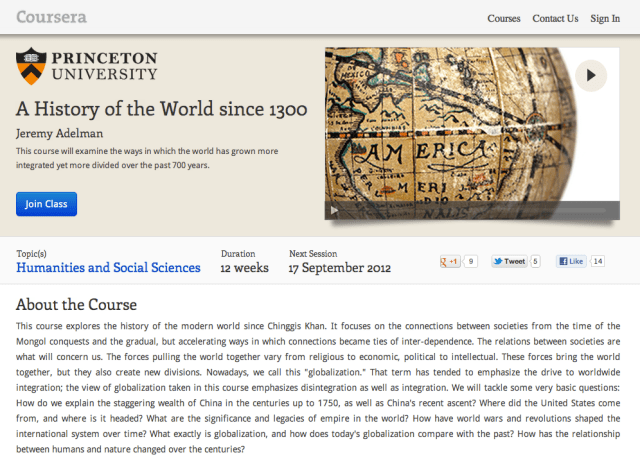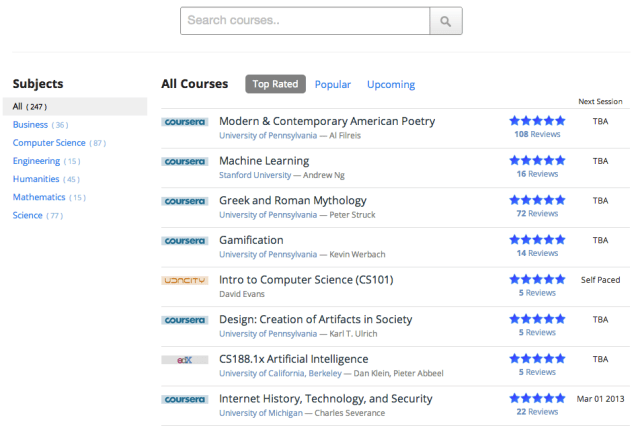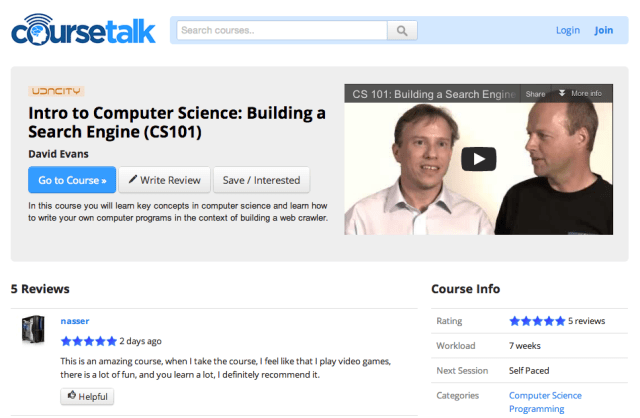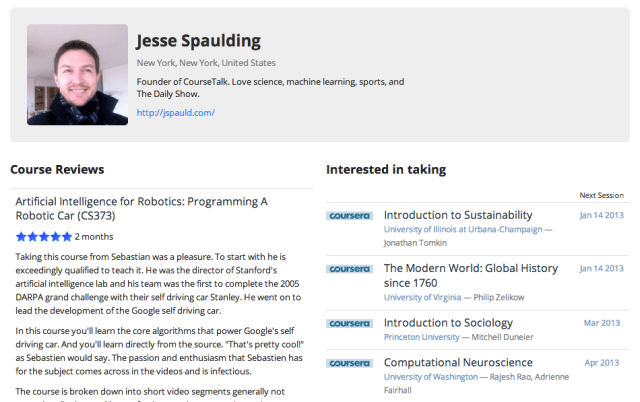One of the most popular topics in education technology these days is the subject of MOOCs, otherwise known as “Massive Open Online Courses.” Thanks to the buzz around MOOC platforms like Coursera, Udacity and edX, there are few universities and colleges that aren’t currently struggling with whether or not they should hop on the bandwagon.
Whether or not you’re long or short on MOOCs, it’s clear that, in the near term at least, they’re here to stay. However, as colleges, universities and more begin toying with open online courses and an increasing number of students and learners take to their virtual lecture halls, the signal-to-noise ratio has the potential to get pretty unfavorable. It’s for this very reason that Jesse Spaulding decided to launch CourseTalk.
The former trader and serial entrepreneur tells us that his interest in MOOCs was spurred after taking a couple of open classes: “Machine Learning” on Coursera and “Programming A Robotic Car” on Udacity. Spaulding said that he had a positive experience in both classes and, knowing that he wasn’t alone in this regard, began considering the cascading effects that MOOCs could have on higher ed. So he created CourseTalk as a way to help learners find signal in the noise of an ever-growing lineup of open online courses.
Today, CourseTalk is what you might expect — an early stage Yelp for MOOCs — a place for students to share their experiences with these courses and a way to discover new courses they’d enjoy. Given that it’s still nascent, the platform’s design is simple and its user experience is straightforward: Visitors can use the general search bar which is front and center, or peruse through “Top Rated,” “Popular” and “Upcoming” verticals, or search by category, like Business, Computer Science, etc.
The site has also begun to compile a (growing) list of the universities offering MOOCs and offers a vertical for the Top Reviewers, as well. As to which platforms it supports? Ultimately, Spaulding wants to list all of them, but for now the focus remains on publicly available courses that anyone can take from anywhere — free or paid.
The platform is currently in the process of adding courses from Canvas.net as well as a bevy of classes from Khan Academy. The usual suspects — Coursera, Udacity and edX — are all there. Down the road, the founder also plans to add vertical services, such as Codecademy and Duolingo.
Piggy-backing on the success of MOOCs seems like a no-brainer, but it doesn’t seem too far-fetched to imagine that MOOC platforms could simply add their own review systems and discovery tools as they grow, taking some of the wind out of CourseTalk’s sails. Of course, Spaulding wants the site to become a discovery platform that spans all MOOC providers and really any online learning resource, so there’s some safety in being a generalist.
Part of what’s disrupting education at present is that learning has been unbundled, such that there are now many services with a diversity of approaches competing (at an increasing scale) for student attention. That potentially makes a fully-independent review service like CourseTalk a valuable addition to the ecosystem, presumably enabling a meritocracy, so that if a MOOC has incredible content, it doesn’t matter how small it is or that it’s not an Ivy.
On the one hand, let’s not get too far ahead of ourselves. To be sure, the number of MOOC platforms are growing — Coursera seems to be having to bat its university suitors away with a stick. It feels like there’s real demand among universities, and there’s no doubt that nearly every higher-ed administration has “MOOC” in big red letters on their whiteboards. But there’s the question of whether this demand is just peer pressure or digital FOMO. In other words, colleges have long been accused of being slow to adopt technology, so if they miss this one, ho boy. The shame.
When a space gets its own Yelp (and CourseTalk already has some competition from Knollop here), it’s generally an indicator of the fact that a bunch of content or businesses came online at once (or at least it seems that way when viewed from five miles up) and end users have no way to make sense of that noise. Sure, there are a lot of schools and programs rushing to take advantage of MOOCs because it’s perceived as a novel technology (even though the MOOC concept has been developing for more than a few months) and because of the scale MOOCs afford.
 Reaching thousands beyond the classroom walls is good for the brand and visibility of both the school and the teacher. Especially considering how important personal branding has become for content producers in the digital age. (Especially this guy.)
Reaching thousands beyond the classroom walls is good for the brand and visibility of both the school and the teacher. Especially considering how important personal branding has become for content producers in the digital age. (Especially this guy.)
Many of the most famous journalists, musicians, artists and even teachers — you know them for their blogs, Twitter streams, and bylines, not their agencies, record labels or institutions. So, one way to look at it is: For professors, MOOCs can be another distribution channel, whereas a platform like CourseTalk can be an amplifier and a regulator.
But at this point the value of MOOCs for teachers is still somewhat nebulous. Distance learning and virtual, video and streaming video-based teaching probably isn’t going anywhere. So there’s a benefit to teachers in learning to familiarize themselves with the different platforms available, with how teaching on a massive, asynchronous virtual platform is different from a synchronous, direct virtual teaching experience and is different from teaching in the classroom.
However, professors have to rely on this latent or implied value, because generally speaking, MOOCs are free, so it’s a community service project for them. And that brings up a salient implication for MOOCs and CourseTalk in turn: MOOCs really don’t have a business model yet. Tons of money invested but little revenue generation. (Great discussion at Inside Higher Ed here.)
A lot of edtech pundits complain when people focus too much on the monetization (the business) side of education technology. But without revenue generation, it’s not unreasonable to think that a number of the current MOOC players won’t be able to survive. What’s more, as of right now, MOOCs have no discernible credentialing standard. Startups like Degreed want to help solve this problem, but that’s not something that’s going to happen overnight.
Drop-out rates are also a problem for MOOCs and online courses. Their content isn’t engaging enough. A massive asynchronous virtual lecture is still basically a virtual lecture. If MOOCs are going to survive, they have to learn how to leverage the underlying technology to increase engagement. Simply adding in-video questions and quizzes probably isn’t enough. At the end of the day, MOOCs still afford universities the ability to reach new audiences, new candidates and their own students. They just have to figure out how to engage them and turn that into something that has real staying power.
If they don’t, CourseTalk’s reviews don’t really amount to much. But for now, a reviews site like CourseTalk has exciting potential because it can start to shine the light on platforms or courses that fail the engagement test and perhaps bring a whole new level of traffic, engagement and relationships to those who do.
For more, find CourseTalk at home here.



